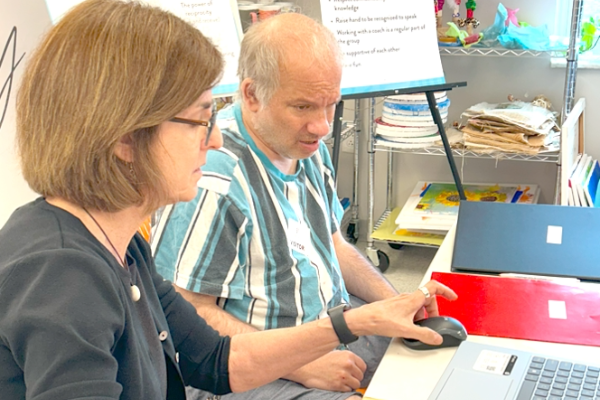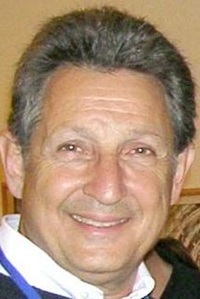07/25/2025
JFSA Approaches Behavorial Health with Wide-Ranging Resources

Wendy Mayaan, associate director of Cognitive Enhancement Therapy, works with a JFSA client during a session. Submitted photo
Jewish Family Service Association (JFSA), a beneficiary agency of the Federation, is celebrating 150 years of serving the community. This story is part of a Cleveland Jewish News series honoring this milestone anniversary.
Article reprinted with permission from Cleveland Jewish News
by Lydia Kacala

Bichsel
For over 50 years, Jewish Family Service Association of Cleveland has been working toward building its behavioral health programming to meet the mental health needs in Cleveland’s Jewish community.
“The word that describes JFSA best is ‘holistic,’” Jon Wise, Achieving Potential Disability Services co-chair and JFSA board member, said in a statement emailed to the Cleveland Jewish News. “We meet our clients with mental illness where they are at with a complete array of services – group homes, adult day programming, and case and medical management. Our services enhance the lives of those we support, empowering them and their families to lead fuller, more meaningful lives.”
While not the only offering from JFSA’s behavioral health programming, Cognitive Enhancement Therapy, as part of The Center for Cognition and Recovery, addresses the aspects of illness that people with schizophrenia cannot medicate, Wendy Mayaan, associate director of Cognitive Enhancement Therapy at JFSA, told the CJN. Medications can assist with positive symptoms – hallucinations or delusions – but cannot help with negative symptoms – depression or lack of pleasure.

Wise
“It’s something that the medications, unfortunately, cannot help our folks with because of the biology and also the development, the stagnation of the development from the onset of the illness,” she said.
Participants in JFSA’s CET programming are typically referred to it, Mayaan said. However, some have learned of CET through JFSA’s planned lifetime assistance network for adults with mental illnesses providing social, recreational and wellness experiences.
“I found out about CET when I applied for PLAN and talked about my struggles with managing my emotions, fear, anger and despair. I felt disorganized and not very motivated,” David, a participant in JFSA’s CET programming, said in a statement emailed to the CJN. “CET has helped with it all. There is a lot of camaraderie that comes from being in a group where you feel like you are not alone. It is huge. Using the computers, we build our frontal lobes together. The most important topic for me has been learning about thinking flexibly and the willingness to change. I have basically learned to do the opposite of what I was doing. I’ve learned everything is attainable.”

Mayaan
Participants also see impacts in their thinking processes.
“The best thing about CET is my thinking has gotten better,” Chris, a CET program participant, said in an emailed statement in the CJN. “My psychiatrist told me that my conversations with her are clearer and more put together. My favorite topic so far is learning about the limbic system and frontal lobe of the brain. The ‘old Chris’ was a little more rambunctious, but now I use my frontal lobe to think about things more. My CET coach has helped me to bring what I have learned in CET to my regular life.”
JFSA’s behavioral health programming also includes certified counseling and case management services, and a collaboration with Cleveland and Kent Hillels to provide mental health services to students as rates of antisemitism rise.
Behavioral health programming helps people of all ages, from college students to older adults, according to Susan Bichsel, president and CEO of JFSA.
“JFSA’s behavioral health programs have been the throughline of the agency since its inception from training young social workers, to evolving as an agency from casework, to an agency of psychotherapists, to a modern health care agency addressing both medical and behavioral health issues,” Bichsel said in a statement emailed to the CJN. “Behavioral health issues are addressed in every area including for those with serious mental illness, for older adults facing bereavement of dementia , and those addressing family violence. Most recently, we have stepped forth to help young adults on campus deal with the impact of rising antisemitism on campus by working with our local Hillels.”
Publisher’s note: The last names of JFSA clients have been withheld to protect their privacy.

